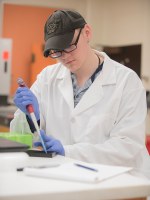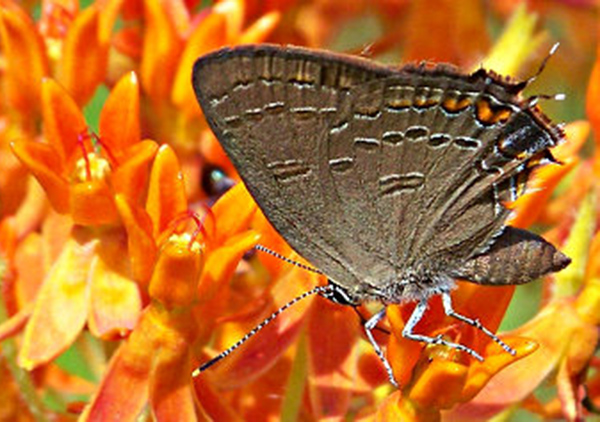Meet NSF graduate fellow Clinton Belott
Major and expected graduation date:
Doctoral student in Cellular and Molecular Biology, Fall 2021
Current Research:
My current research is based on the astounding phenomenon called anhydrobiosis, or life without water. This ability is observed in extremophilic (harsh-loving) organisms and allows them to approach suspended animation. While this field of study has been in place since the time of Van Leeuwenhoek (1702), little is known about how these organism’s cells cope with water loss at the molecular level. What is known, however, is these organisms synthesize unique proteins, termed LEA proteins, to survive virtually complete water loss.
To explore how these LEA proteins protect during drying, I take genes that make these proteins from an anhydrobiotic brine shrimp (commonly known as “sea monkeys”) and transfer these genetic instructions to make LEA proteins into an insect cell line that is sensitive to drying. Following the addition of the new genes, I then bring the cells to varying levels of water loss and observe if they do better than cells without LEA proteins. This allows me to quantify any increase in water-loss tolerance.
My research allows us to better understand how each one of these unique proteins helps the brine shrimp to enter anhydrobiosis and my work may lead to some practical applications. For instance, advancing our understanding in this field may allow us to preserve cell samples in a dried state. This would save researchers and cell distributors (e.g. The Drosophila Genomics Resource Center at Indiana University) the hassle and expense of using expensive storage approaches that depend on storage at subzero temperatures (e.g. liquid nitrogen).
What inspired you to choose that topic for your research?
Ever since I can remember, I have always found every topic of biology absolutely fascinating, from ecology to molecular biology. I even recall reading my older brother’s college-level microbiology textbook when I was in sixth grade! Upon joining Dr. Michael Menze’s laboratory in 2013 as an undergraduate student at Eastern Illinois University, his enthusiasm for anhydrobiosis caught my attention and I have studied under his guidance ever since. In 2016, Dr. Menze was offered a position in the College of Arts & Sciences at UofL and he accepted. When we moved our laboratory, I transferred from being a master’s student (the highest degree offered at Eastern Illinois University) to a doctoral student in Cellular and Molecular Biology in A&S.
Tell me about your NSF award. What was the application process like and how will it impact you personally and academically?
The National Science Foundation Graduate Research Fellowship (NSF GRF) is a highly competitive fellowship and is often described as one of the highest honors a graduate student in America can be awarded. The NSF-GRF provides support for three years and offers a $34,000/year stipend along with a $12,000/year allowance and access to additional research funding opportunities. The application for the NSF-GRF is based around the student’s research and personal statements. A good research statement demonstrates to NSF the student’s capabilities in the laboratory and outlines a project worthy of support. In contrast, the personal statement is about the student’s background and outreach efforts.
While many applicants may believe a strong research statement is sufficient to merit the award, this is not the case. NSF has a sincere interest in promoting science education to people from diverse backgrounds, including those from underprivileged or underrepresented groups. My main outreach activities involve providing hands-on and inquiry-based science to rural high schools and tutoring students with disabilities in chemistry and biology. I chose these activities because I came from a high school with a student body with less than 75 students and no science opportunities. Furthermore, I have struggled with severe dyslexia throughout my academic career.
My goal is to provide students with encouragement to pursue higher education and to not be discouraged because of where they come from, or what challenges they may face.
 Tell me a little about your background and how you came to be a graduate student in A&S? In Biology?
Tell me a little about your background and how you came to be a graduate student in A&S? In Biology?
As I alluded to in the previous section, I came from a very small high school of only 75 students and I had severe dyslexia. When I was in first grade, my mother was told, “It will be a miracle if he can graduate high school.” From that point on, my mother tutored me after school for several hours in reading and writing, despite her working two or three part-time jobs. When I was in third grade, my grades were on par with other students. It was then I learned one could overcome a seemingly impossible challenge with the help of others.
Unfortunately, I was no longer considering a career in science by the time I entered high school due to a few poor science teachers. This changed when I met Ms. Dorsey, my high school science teacher. Her enthusiasm for science and particularly the scientific method made me fall back in love with science. I will always remember the day she yelled at me when I said, “I’m not going to college. How could I ever be competitive at that level?” It is thanks to her encouragement that I decided to pursue a science degree in higher education. I have now earned an associate degree in biology from Parkland College (Champaign-Urbana, IL) and a bachelor’s degree in biology from Eastern Illinois University (Charleston, IL).
When did you know you wanted to be a biologist? Why did you make that choice?
As I noted earlier, I was always interested in biology and knew I wanted to be a biologist. From a very young age, I was fascinated about understanding things we cannot directly see with our eyes and how we have to use our imagination and intellect to explore them. Unfortunately, a few poor science teachers almost turned me away from science, particularly due to my poor spelling and handwriting caused by my dyslexia. Fortunately, Ms. Dorsey understood that those things can be overcome with time and help. After taking Ms. Dorsey’s Biology I and II classes in my freshmen year, I realized I wanted to be a biologist and I could become one if I put forth the necessary time and effort.
Do you have any key mentors? Tell me about them.
I have three key academic mentors, all of whom I have already discussed briefly. The first would be my mother. She helped me considerably to overcome my dyslexia and to realize how important it is to help those in need. The second would be my high school teacher Ms. Dorsey. She helped me fall back in love with science and realize I could be competitive at the college level if I put in the necessary time and effort. The third is Dr. Menze. He pushes me every day to become a better scientist while always encouraging me to find new ways to help other aspiring scientists.
What is the most important issue facing the world today?
That is certainly climate change. Climate, unlike weather, is the average trend of temperature over long periods of time. As the world’s climate changes, some places will become warmer and others colder. Perhaps the most frightening possibility is the inability to grow corn and other crops in states that currently produce them (e.g. Illinois and Indiana). Simply said, the soil properties in these states are not found elsewhere and the inability to use them would undoubtedly cause massive food shortages.
Advice for aspiring scientists?
Don’t ever sell yourself short. Regardless of your background and weaknesses, you can always become a great scientist if you are willing to put forth the time and effort into your education. And most importantly, never stop learning.

